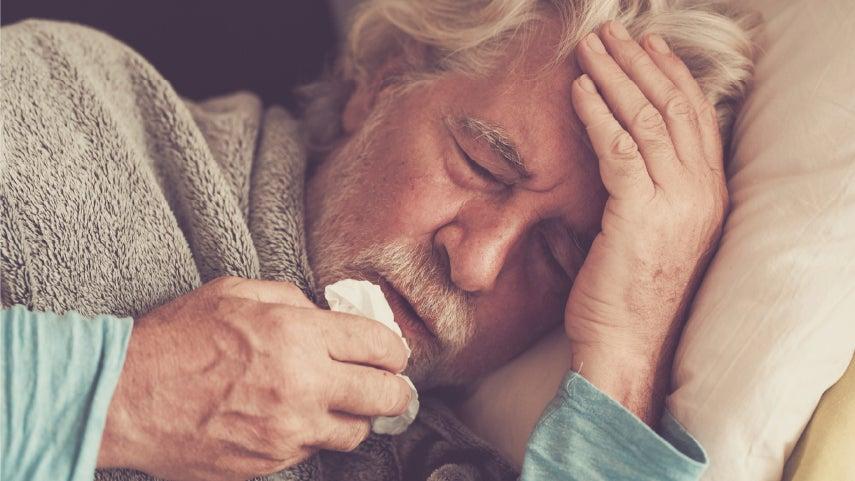COVID-19 Has Not Gone Away: Here’s How Older Adults Can Stay Safe
10 min read

Related Topics
While preventing the spread of COVID is no longer a public health emergency, it remains a public health priority. That’s because the virus is still circulating widely in our communities—not just during cold and flu season, but year-round.
According to estimates from the Centers for Disease Control and Prevention (CDC), between Oct. 1, 2024 and June 7, 2025 there were:
- Up to 16.1 million COVID-related illnesses
- Up to 3.8 million COVID-related outpatient visits
- Up to 440,000 COVID-related hospitalizations
- Up to 51,000 COVID-related deaths1
Avoiding a COVID infection should be high on your priority list, too, especially if you’re age 65 or older, you have one or more chronic health conditions, or you’re immunocompromised.
The best defenses against the virus are largely the same as they were during the pandemic: making sure your vaccinations are up to date, wearing a mask in appropriate settings, and washing your hands frequently.
How risky is COVID now for older adults?
According to CDC, 81% of COVID deaths happen among people who are older than 65.2 The risk of becoming seriously ill, getting hospitalized, or dying increases with age.
Underlying health conditions like cancer, chronic lung disease, heart disease, weakened immune system, and sickle cell disease continue to add to the already elevated COVID risk levels for older adults.
Keep in mind that even though it may feel life has mostly gotten back to “normal” since the pandemic, the risk of COVID is still there. That’s why it’s important to stay mindful of your health—by keeping up with vaccines, practicing good handwashing, and making safe choices in crowded places when needed. Taking these steps helps you continue enjoying the things you love while protecting yourself and those around you.
What is the 2025-2026 COVID vaccine guidance for older adults?
The CDC Advisory Committee on Immunization Practices (ACIP) recently updated the COVID-19 vaccine schedule. Under the new guidance, vaccination for anyone age 6 months and older is now a personal choice made together with a health care provider.
“The evidence is clear: vaccines are a safe and highly effective way to reduce your risk of severe illness, hospitalization, and death from respiratory viruses like COVID,” says Dorothea Vafiadis, Senior Director of NCOA’s Center for Healthy Aging. “For adults 65 and older—and those with conditions like heart disease, diabetes, or lung disease—the benefits of vaccination are especially strong.”
NCOA recommends older adults talk with their doctor, pharmacist, or nurse about their individual health risks and get the updated 2025-2026 COVID, flu, and RSV vaccines for the best protection. “Vaccination is a simple yet powerful way to stay healthy, independent, and active as we age,” Vafiadis explains.
Will COVID eventually fade away?
Just like the flu and other infectious diseases, COVID is a disease we’ll probably be living with for a long time. It has now become endemic, according to CDC officials. That simply means it’s here to stay, much like the flu and the common cold. While COVID has some seasonal patterns like the flu, it can also be unpredictable and peak at all different times throughout the year.
How can I still participate in activities and reduce my COVID risk?
Your best strategy to avoid COVID infection is a layered series of protections:
1. Get vaccinated
First and foremost, it’s important to stay up to date on your COVID vaccinations. Getting vaccinated is still the best defense against serious illness, hospitalization, and death from this virus.
Vaccination against COVID may offer other protections, too. A Cedars-Sinai study found that vaccinated people had a lower risk of developing post-COVID diabetes.3 And a study in the International Journal of Environmental Research and Public Health concluded COVID vaccines protect against such persisting—or "long COVID"—symptoms as kidney disease, cognitive problems, and sleeping disorders.4
2. Wear a high-quality mask
The CDC calls masks "an additional prevention strategy that you can choose to further protect yourself and others." Masks can help lower the spread of germs by blocking some of what you breathe in and out. If someone who is sick wears a mask, it reduces the chance of passing illness to others. Masks can also protect you from breathing in germs—especially N95 or KN95 masks that fit snugly around your mouth and nose.
It’s a good idea to wear the most protective mask you have available when:
- You are in a crowded space.
- There are many cases of respiratory illness in your community.
- You or someone close to you was recently exposed, is sick, or is getting better.
3. Wash your hands frequently
Not only does handwashing help stop the spread of COVID; it's a tried-and-true public health practice to protect against all types of infections like colds and flu. Most of us became expert hand-washers at the start of the pandemic, but it may be time for a refresher on hand hygiene best practices.
4. Take steps for cleaner air
COVID mainly spreads through tiny droplets and particles that come out when an infected person breathes, talks, coughs, or sneezes. These particles can spread through the air, especially indoors in crowded places with little airflow.
You can lower your risk by:
- Opening windows
- Using air purifiers
- Spending time outdoors, where the air is fresher
Find other preventive actions you can take from CDC's How to Protect Yourself and Others.
What should I do if I think I have COVID?
It is recommended that you keep a ready supply of COVID rapid tests at home so that you can test if you have symptoms of COVID. To learn about tests for COVID and where to get home rapid tests, check out this Guide to COVID-19 Testing for Seniors. When taking an at-home rapid test, be sure to follow the instructions carefully, as instructions may vary slightly from manufacturer to manufacturer.
What should I do if I test positive for COVID?
If you test positive for COVID, notify your doctor right away—even if your symptoms are mild. Treatments are available that can decrease your chances of getting seriously ill and dying from COVID.
People who are more likely to get very sick from covid are:
- Adults age 65 and older (with risk increasing with age)
- People who are not vaccinated against COVID
- People with certain medical conditions, such as chronic lung disease, diabetes, heart disease, obesity, or a weakened immune system
Medications to treat COVID-19, such as Paxlovid, must be prescribed by a health care provider. And for treatment to be effective, it must be started within five days after you first develop COVID symptoms.
Want to know more about protecting your health? Visit our Vaccine Information and Resources page.
Sources
1. CDC. Preliminary Estimates of COVID-19 Burden for 2024-2025. Accessed June 20, 2025. Found on the internet at https://www.cdc.gov/covid/php/surveillance/burden-estimates.html
2. CDC. People with Certain Medical Conditions and COVID-19 Risk Factors. Updated June 11, 2025. Found on the internet at https://www.cdc.gov/covid/risk-factors/index.html
3. Alan C. Kwan, et al. Association of COVID-19 Vaccination With Risk for Incident Diabetes After COVID-19 Infection. JAMA Network Open. Feb. 14, 2023. Found on the internet at https://www.cedars-sinai.org/newsroom/verified-covid-19-infection-increases-diabetes-risk/
4. Peng Gao, et al. Effect of COVID-19 Vaccines on Reducing the Risk of Long COVID in the Real World: A Systemic Review and Meta-Analysis. International Journal of Environmental Research and Public Health. September 2022. Found on the internet at https://pubmed.ncbi.nlm.nih.gov/36231717/


